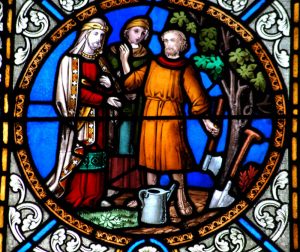Thoughts on Sunday’s Lessons for March 20, 2022 (Lent 3C)
First Reading: Exodus 3:1-15
Scripture offers us scores of images and metaphors to help us visualize a God who is beyond our imagining. It is no surprise that its efforts to portray some small sense of God’s power sometimes stretch our imagination.

The Gardener and the Fig Tree from Luke 13:1-9; stained-glass window in St. Mary’s Church of Ireland in Dungarvan, Waterford County, Ireland. (Click image to enlarge.)
One such image is fire. God led the Israelites in the wilderness as a pillar of fire and column of smoke, and, as we hear in Sunday’s first reading, God surprises Moses by speaking out of a bush that burns and burns but is not consumed. The people have suffered enough in slavery in Egypt, God says. Moses receives God’s call to lead the people out of slavery to a promised land that flows with milk and honey.
Psalm: Psalm 63:1-8
The Psalmist creates the striking metaphor of a voice crying out in the wilderness. The one who speaks – traditionally said to be David in the Wilderness of Judah – is alone and thirsty, yet nevertheless they trust in God. Even in a barren and dry and probably scary place where there is no water, their souls thirst not for mere liquid refreshment but for God: God’s loving-kindness is better than life itself. Even in hard times we trust in God, finding comfort under the shadow of God’s wings, held in God’s strong right hand.
Second Reading: 1 Corinthians 10:1-13
In verses that draw together the themes of Sunday’s First Reading, Psalm and Gospel, Paul reminds his audience that many of the Israelites died in the wilderness. He argues that these bad things happened because God was not pleased with them. Recalling lessons from Exodus, Paul urges the people of Corinth not to practice idolatry, an issue that frequently arose among this community’s formerly pagan Christians. Don’t put Christ to the test, Paul warns. Don’t complain. These things happened to our ancestors to serve as an example to us, Paul wrote, reminding the people to be faithful during hard times: God will provide strength.
Gospel: Luke 13:1-9
Pilate had murdered a group of Galileans in grisly fashion, and more people had died unexpectedly when a tower fell. A crowd clustered around Jesus, worried. Why did these bad things happen to good people, they asked. Were these people punished because they had sinned? God does not punish sin with suffering, Jesus told them. But repentance – turning away from bad behavior – brings forgiveness and eternal life. Then Jesus told them a parable about a gardener who allowed a barren fig tree one more year of nurturing in hope it would bear fruit. Like the fig tree in this story, Jesus tells the crowd, it’s best to repent and wait for God’s forgiveness and another chance.
